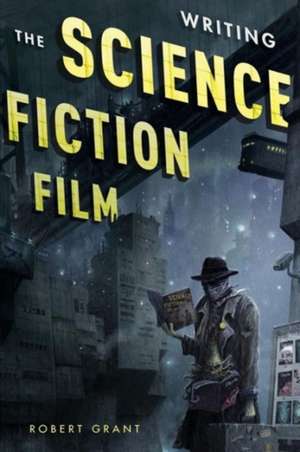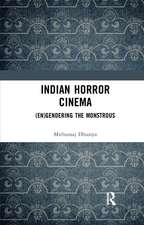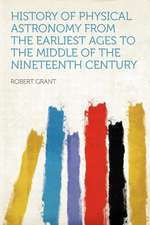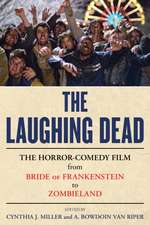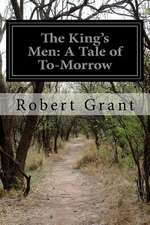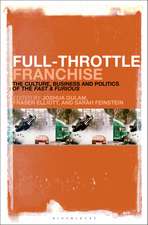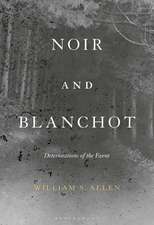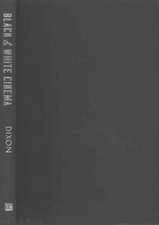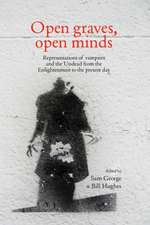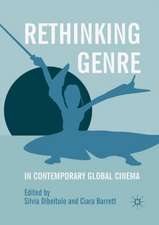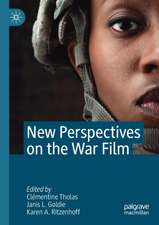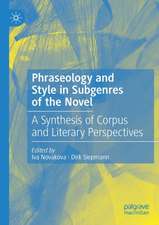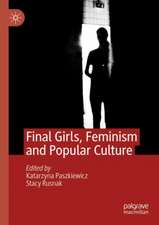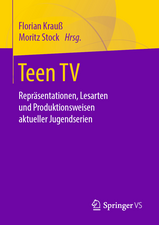Writing the Science Fiction Film
Autor Robert Granten Limba Engleză Paperback – 31 mar 2013
Writing the Science Fiction Film describes the kinds of stories that work best as science fiction, explores the parameters of the science fiction genre, and shows what science fiction can offer to writers that other genres cannot.
Preț: 146.80 lei
Nou
Puncte Express: 220
Preț estimativ în valută:
28.09€ • 28.98$ • 23.44£
28.09€ • 28.98$ • 23.44£
Carte disponibilă
Livrare economică 06-20 martie
Preluare comenzi: 021 569.72.76
Specificații
ISBN-13: 9781615931361
ISBN-10: 1615931368
Pagini: 250
Dimensiuni: 154 x 228 x 17 mm
Greutate: 0.42 kg
Editura: Michael Wiese Productions
ISBN-10: 1615931368
Pagini: 250
Dimensiuni: 154 x 228 x 17 mm
Greutate: 0.42 kg
Editura: Michael Wiese Productions
Cuprins
Introduction
Chapter 1: What is Science Fiction?
• ?The difference between science fiction and fantasy
• Why write science fiction?
• A genre or a setting?
• The science fiction landscape
• Exercise one
Chapter 2: Finding your story
• Finding the future in the present
• Everyday tools for collecting ideas
• What if? and the vast pool of story sources
• Close to home or far, far away
• Exercise two
Chapter 3: Creating characters
• But it’s about people, right?
• Who is your hero, and why that guy?
• Sidekicks and buddies
• Family, factions, friction and foes
• Human characters
• Non-Human characters - how alien is alien?
• Thinking about viewpoint
• Exercise three
Chapter 4: Plotting
• Turning an idea into a story
• Brainstorming
• What are you trying to say?
• Establishing Theme
• Avoiding clichés
• Exercise four
Chapter 5: Building your world
• Deciding on setting
• Establishing rules
• Sketching the backdrop
• Drawing in the detail
• Exercise five
Chapter 6: ?Getting the Science Right Part 1
• Indistinguishable from magic
• When the science matters….
• ….and when it doesn’t
• Right science and lazy science
• Doing the research
• Exercise six
Chapter 7: ?Getting the Science Right Part 2
• People and places
• About robots
• Travelling through space
• The physics of space
• Noise and explosions
• A word about time travel
• Exercise seven
Chapter 8: “George, you can type this shit, but you sure as hell can’t say it.”
• The dialogue of the future
• The way people speak
• Make it make sense
• Formal speech and street slang
• Creating an alien language
• Dealing with exposition
• Making description work harder
• Exercise eight
Chapter 9: Start writing
• Mood and tone
• The opening scene
• The first 10 pages
• Don’t bore the reader
• Don’t baffle the reader
• Exercise nine
Chapter 10: Why stop at writing?
• The future is now
• Lo/No-budget science fiction
• Crowdfunding and crowdsourcing
• Shooting on digital
• Desktop CGI, Props and f/x
• Digital distribution
The Last Word
Genre Festivals
Chapter 1: What is Science Fiction?
• ?The difference between science fiction and fantasy
• Why write science fiction?
• A genre or a setting?
• The science fiction landscape
• Exercise one
Chapter 2: Finding your story
• Finding the future in the present
• Everyday tools for collecting ideas
• What if? and the vast pool of story sources
• Close to home or far, far away
• Exercise two
Chapter 3: Creating characters
• But it’s about people, right?
• Who is your hero, and why that guy?
• Sidekicks and buddies
• Family, factions, friction and foes
• Human characters
• Non-Human characters - how alien is alien?
• Thinking about viewpoint
• Exercise three
Chapter 4: Plotting
• Turning an idea into a story
• Brainstorming
• What are you trying to say?
• Establishing Theme
• Avoiding clichés
• Exercise four
Chapter 5: Building your world
• Deciding on setting
• Establishing rules
• Sketching the backdrop
• Drawing in the detail
• Exercise five
Chapter 6: ?Getting the Science Right Part 1
• Indistinguishable from magic
• When the science matters….
• ….and when it doesn’t
• Right science and lazy science
• Doing the research
• Exercise six
Chapter 7: ?Getting the Science Right Part 2
• People and places
• About robots
• Travelling through space
• The physics of space
• Noise and explosions
• A word about time travel
• Exercise seven
Chapter 8: “George, you can type this shit, but you sure as hell can’t say it.”
• The dialogue of the future
• The way people speak
• Make it make sense
• Formal speech and street slang
• Creating an alien language
• Dealing with exposition
• Making description work harder
• Exercise eight
Chapter 9: Start writing
• Mood and tone
• The opening scene
• The first 10 pages
• Don’t bore the reader
• Don’t baffle the reader
• Exercise nine
Chapter 10: Why stop at writing?
• The future is now
• Lo/No-budget science fiction
• Crowdfunding and crowdsourcing
• Shooting on digital
• Desktop CGI, Props and f/x
• Digital distribution
The Last Word
Genre Festivals
Notă biografică
Robert Grant is a filmmaker, screenwriter, critic, and script consultant based in London, with a penchant for science fiction and fantasy. He sits on the jury of the Arthur C. Clarke Award for Science Fiction Literature, the most prestigious science fiction award the UK has to offer, and is one of the core team behind The London International Festival of Science Fiction and Fantastic Film. Grant runs the workshops and panels that make up the filmmaking and literary strands of the festival, as well as serving as Literary Editor for Sci-Fi-London.com.
Extras
“What is science fiction?” is a question that’s been debated since the idea of “genre” has been around, and it’s never really been satisfactorily answered. It’s a bit like being asked “What is good taste?” It’s kind of hard to pin down, but you’ll know it when you see it. I mean, it’s easy when you’re watching a film with spaceships or aliens in it to point at the screen and say “Now that’s sci-fi.” But really, we both know there’s a whole lot more to science fiction than the obvious tropes.
Whenever this question comes up I always say that the clue is in the name. It’s SCIENCE fiction. That means that the story must absolutely rely on science in order to be told, and if it doesn’t, then it’s probably fantasy. Now that doesn’t mean that the science in the story has to be real. Neither does it have to make sense (except within the logical parameters of its own world, and we’ll get to that later). And it doesn’t have to be set in the future, so I’m not necessarily talking about robots or spacecraft or “phasers on stun.” But the science does have to be one of the major driving forces of the story. Without the science, the story could not be told.
Whenever this question comes up I always say that the clue is in the name. It’s SCIENCE fiction. That means that the story must absolutely rely on science in order to be told, and if it doesn’t, then it’s probably fantasy. Now that doesn’t mean that the science in the story has to be real. Neither does it have to make sense (except within the logical parameters of its own world, and we’ll get to that later). And it doesn’t have to be set in the future, so I’m not necessarily talking about robots or spacecraft or “phasers on stun.” But the science does have to be one of the major driving forces of the story. Without the science, the story could not be told.
Descriere
Writing the Science Fiction Film describes the kinds of stories that work best as science fiction, explores the parameters of the science fiction genre, and shows what science fiction can offer to writers that other genres cannot.
